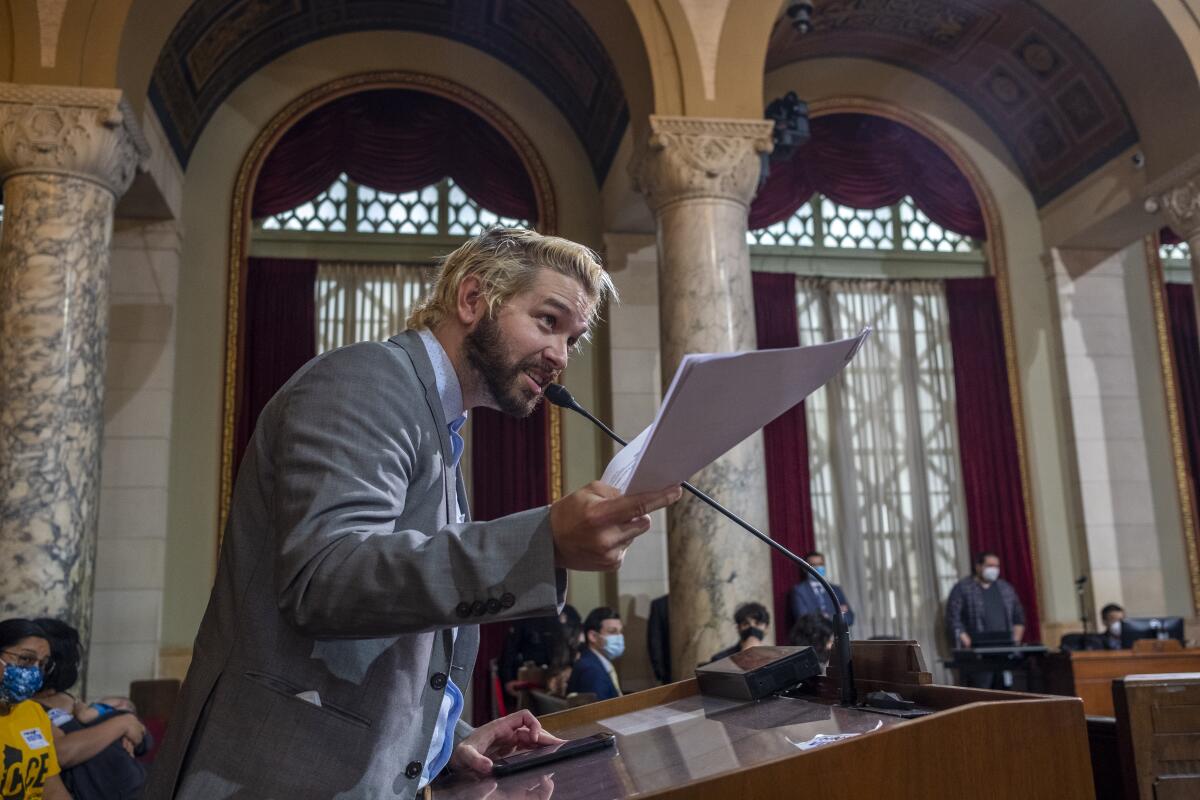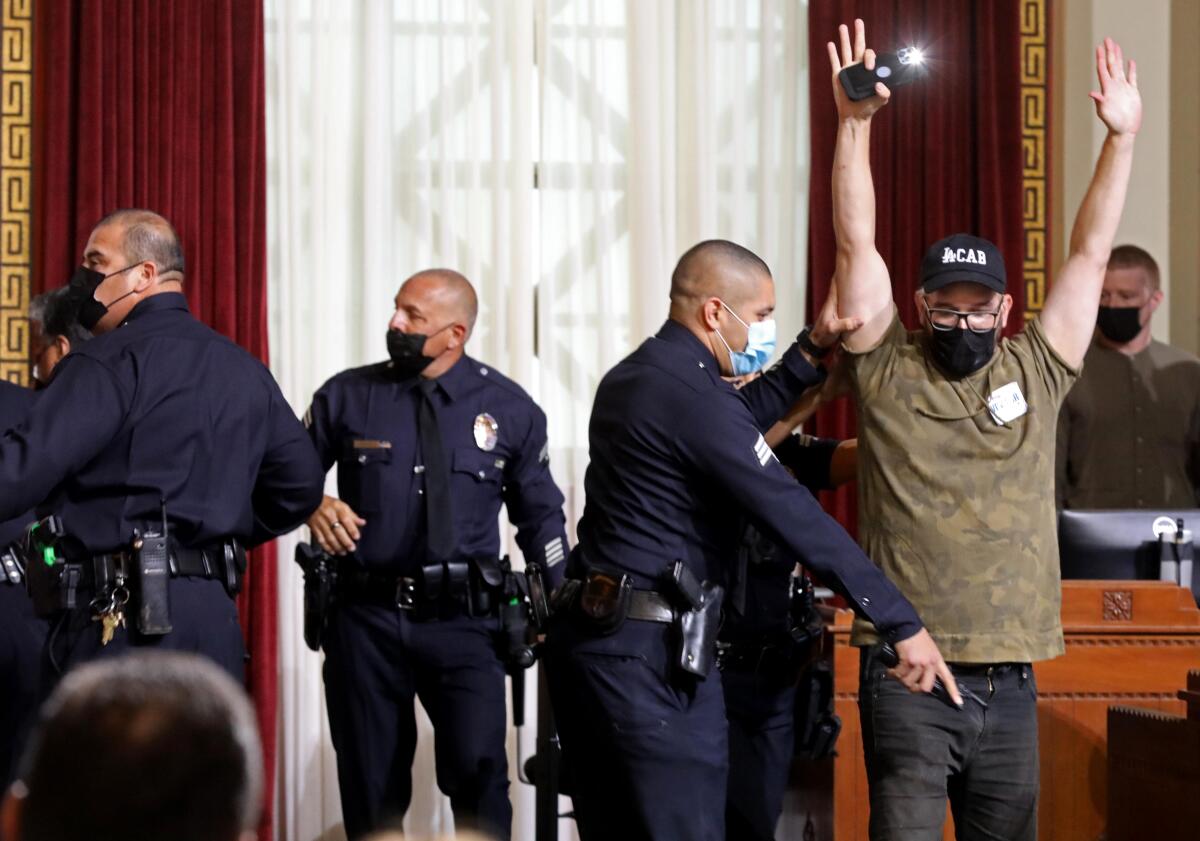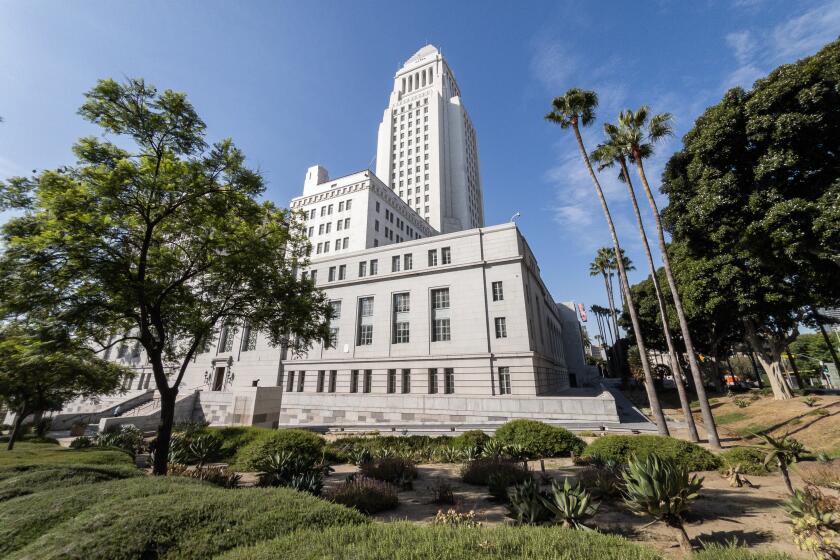LAPD voiced concerns about city attorney’s push to charge a protester, memo says

Earlier this year, high-level officials in the Los Angeles Police Department asked for a meeting with city prosecutors to discuss a source of friction between their two offices.
Los Angeles City Atty. Hydee Feldstein Soto had been pushing for criminal charges against a man she suspected was among the pro-Palestinian protesters who sprayed red paint and set off smoke devices outside the Brentwood home of a prominent Jewish civic leader, according to a memo summarizing the March 7 meeting.
Feldstein Soto had gone to then-Police Chief Michel Moore to assert that Ricci Sergienko was involved in the Thanksgiving Day protest, according to the memo, a copy of which was reviewed by The Times.
However, Sergienko could not be identified in video footage from the scene, the LAPD’s lead detective on the case, Amgad Youssef, said at the meeting.
“For reasons unknown, the City Attorney expressed inordinate interest in the progress of a mass protest investigation, going so far as to suggest the identification of a specific individual for prosecution to the Chief of Police,” wrote Dennis Kong, head deputy for the city attorney’s regulatory prosecution division, in his memo summarizing the issues raised by the LAPD.
The concerns described in the memo by the LAPD and Feldstein Soto’s own prosecutors raise questions about why she would have gone to such lengths to single out Sergienko, one of her most outspoken critics.
The protest, which sparked outrage at City Hall and a hate crime investigation by the LAPD, took place outside the home of attorney Michael Tuchin, president of the American Israel Public Affairs Committee, or AIPAC. He donated $1,500 to Feldstein Soto’s campaign in 2022.
Feldstein Soto did not respond to emailed questions about the memo, which was dated April 9. Tuchin and Moore, who retired from the LAPD in February, also did not reply to messages from The Times.
Kong did not respond to several requests for comment.
LAPD officials called for the March 7 meeting to raise concerns with Feldstein Soto’s subordinates that their boss had accused the LAPD of failing to “diligently” pursue the matter, the memo said. They also wanted to discuss Feldstein Soto’s “particular interest and sense of urgency in charging Sergienko.”
At the meeting, the contingent from the city attorney’s office assured LAPD officials — including Assistant Chief Blake Chow and Deputy Chief David Kowalski of the Counter-Terrorism and Special Operations Bureau — that they did not share their boss’ concerns with the progress of the investigation.
In his memo, Kong said the city attorney’s office pursues charges “based on probable cause and not politics” — and that it appeared that Feldstein Soto may have implicated Sergienko to the LAPD “without such cause.”
Feldstein Soto “unilaterally” contacted the LAPD to offer her opinion about a potential suspect “without knowledge about the state of the evidence,” and without notifying her office’s criminal branch, Kong wrote.
Sergienko is an organizer with the leftist political group People’s City Council. He has taken part in protests at City Hall and elsewhere, including candidate debates and the homes of elected city officials. The People’s City Council has been a longstanding foe of Feldstein Soto, calling her “corrupt” and accusing her of doing the bidding of special interests.
The group has also posted excerpts from Feldstein Soto’s decade-old divorce case on social media, including a filing from her ex-husband describing her conduct as “bizarre.”
Colleen Flynn, Sergienko’s attorney, said she was “floored” by Feldstein Soto’s conduct as described in the April 9 memo. Flynn said Feldstein Soto is “out of control,” abusing her power and going after Sergienko because of his political views.
“I hope that the city attorney does the right thing and immediately resigns, because this is completely unacceptable for a first-class city,” she said.

Feldstein Soto recently launched her campaign for a second term heading an office that prosecutes misdemeanors, defends the city against lawsuits and drafts legislation.
Since taking office in December 2022, she has faced criticism over her decision to sue a journalist who lawfully obtained headshots of Los Angeles police officers from the city. The City Council voted Friday to pay $300,000 to settle that case.
The memo, and the apparent effort by Feldstein Soto’s prosecutors to distance themselves from her actions, are the latest signs of tension within the city attorney’s office. At least four staffers have filed retaliation claims against the office this year.
Sean C. Tyler, an administrative coordinator, suggested in a July 26 filing that Feldstein Soto had attempted to use the criminal justice system to “silence” Sergienko. In his filing, Tyler questioned whether Feldstein Soto gave Tuchin favorable treatment because he was a campaign donor. Tyler also accused her of secretly reading employees’ emails.
Last week, an aide to Feldstein Soto called Tyler’s allegations “flamboyant” and said there is no truth to them.
L.A. city attorney is searching through employee emails, creating a climate of fear, staffer alleges
In a six-page document, the city worker also accused City Atty. Hydee Feldstein Soto of using ‘intimidation tactics’ to discourage dissent in the office.
Youssef, the LAPD detective, referred The Times to the LAPD’s press team, which declined to discuss the situation.
“The case in question is still with the City Attorney’s Office for review and filing consideration,” Det. Meghan Aguilar said in an email.
In 2022, before Feldstein Soto was elected, the city attorney’s office filed charges against Sergienko after he and other protesters disrupted a Los Angeles City Council meeting. Sergienko was charged with resisting arrest and battery on an officer, among other things. Last year, a judge allowed Sergienko and another defendant to participate in a diversion program.
When the case was dismissed, Sergienko posed for a photo in the courthouse with his middle finger extended. The People’s City Council posted the photo on social media with a vulgarity aimed at Feldstein Soto.
Last fall, the People’s City Council posted videos of the Thanksgiving Day protest on the social platform X, calling it a “holiday wake up call” for Tuchin and his family. Protesters opposed to Israel’s war in Gaza left bundles of white cloth spattered with red paint to represent blood-spattered babies.
They also set off smoke devices, sprayed red paint on the driveway and carried a banner with the message “F— UR HOLIDAY! BABY KILLER.”
Mayor Karen Bass condemned the protest, as did leaders from the city’s Jewish community. Feldstein Soto also weighed in, saying on X that trespassing, vandalism and threats against others “are not protected speech and should be prosecuted.”
Behind the scenes, she went further, according to the memo, telling police she had “positively identified and recognized Sergienko” from surveillance footage of the protest. Feldstein Soto told her staff that she had had “several” communications with the police chief about “Sergienko’s involvement in the protest,” the memo said.
Moore, in turn, asked his subordinates “why Sergienko was not yet named as a primary suspect for possible charges,” the memo said.
Flynn, the lawyer representing Sergienko, said she does not know if her client was at the protest.
“But if he was, there’s certainly nothing in that memo, or from that police investigation, that shows there was any unlawful activity on his part,” she said. “Therefore, her only motivation to go after him is purely political and to try to silence his criticism.”

Youssef, the LAPD detective, said at the March 7 meeting that Feldstein Soto kept mentioning Sergienko during the investigation’s initial phase, according to Kong’s memo.
The best video footage of the protest showed a “random individual” who was “covered from head to toe,” Youssef told attendees at the meeting. The LAPD could not place Sergienko at the scene or otherwise positively identify him as a suspect for “inciting public disorder and vandalism,” Youssef said, according to the memo.
Youssef was also trying to use cellphone data to identify suspects, the memo said.
If Feldstein Soto was presenting herself as a potential witness in the case or had a stake in it somehow, that would create a conflict of interest, not just for herself but possibly her prosecution team, said Laurie Levenson, a professor of criminal law at Loyola Law School.
Levenson said she was struck by the apparent lack of trust between Feldstein Soto and her prosecutors. The memo, Levenson said, indicates that there is “a political battle going on within her own office.”
On an 8-3 vote, the City Council voted to approve $50,000 in legal services in response to a blistering retaliation claim. The city attorney had asked for $500,000.
Kong addressed his memo to Michelle McGinnis, who was then the office’s criminal branch chief. Two weeks later, McGinnis was placed on leave and escorted out of the office, according to a claim for damages she filed with the city in June.
In her claim, McGinnis did not mention Sergienko by name. However, she accused Feldstein Soto of directing her to prosecute a person whom Feldstein Soto “believed to be present in a video of protesters” in the West Los Angeles area last year.
McGinnis said in her claim that Feldstein Soto gave those directions “based on her personal or political beliefs, and/or for her personal, political gain.”
An aide to Feldstein Soto broadly disputed many of the allegations in McGinnis’ claim but did not provide specifics.
More to Read
Sign up for Essential California
The most important California stories and recommendations in your inbox every morning.
You may occasionally receive promotional content from the Los Angeles Times.













